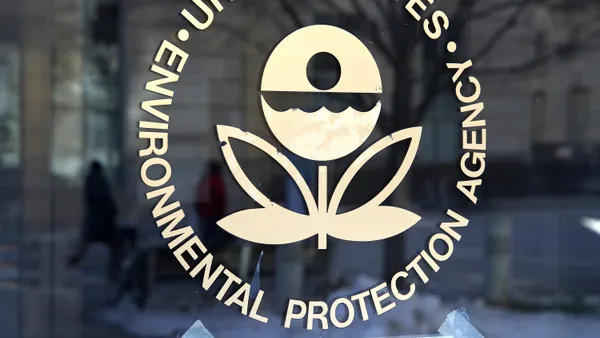Dive Brief:
- Shareholders at Goldman Sachs and Levi Strauss Corp. rejected proposals from conservative think tanks asking the companies to stop diversity, equity and inclusion related practices at their annual investor meetings last week.
- At Goldman Sachs, investors representing less than 2% of shares voted in favor of a proposal that asked the financial institution to eliminate DEI goals in executive pay initiatives at its annual meeting on Wednesday, according to a Friday securities filing. Meanwhile, less than 1% of shareholders at Levi’s supported a similar measure asking the clothing company to scrap its DEI programs during its annual meeting the same day, according to Women’s Wear Daily.
- The number of anti-ESG proposals, including those aimed at company DEI programs, has increased this proxy season, though it has not been accompanied by a rise in support. Shareholders also overwhelmingly rejected proposals aimed at company DEI practices at Apple and Costco already this proxy season.
Dive Insight:
The National Legal and Policy Center issued the proposal to the board at Goldman Sachs, while the National Center for Public Policy Research issued a proposal to Levi’s, identical to the ones submitted to Costco and Apple. Management at Goldman Sachs and Levi’s both recommended shareholders vote against the proposals in their respective proxy materials. Shareholders have also rejected anti-DEI proposals at John Deere and Disney at annual meetings this year.
The proposal to Goldman Sachs’ board asked the company to revisit its executive pay practices, particularly with respect to how the company considers any DEI goals as part of its compensation practice. The board at Goldman Sachs had “unanimously” recommended voting against the proposal in its proxy statement last month and said it “misunderstands the firm’s compensation process.”
“This proposal is premised on a fundamental mischaracterization of our compensation process,” Goldman’s management wrote. “Compensation for our senior management is based on many considerations, but meeting numerical hiring or promotion goals is not one of them.”
The logic the National Legal and Policy Center included as a supporting statement for submitting the proposal was very similar to the argument that the NCPPR made for why Levi’s should abandon its DEI efforts. Both proposals argued that companies with DEI policies leave themselves open to litigation in light of the Supreme Court’s 2023 decision barring the use of race-conscious admissions in higher education.
The NCPPR proposal was the only shareholder proposal up for a vote at Levi’s this year. The conservative think tank’s proposal requested Levi’s stop its DEI program, including its employee resource groups, supplier diversity program, and no longer consider race and gender in its hiring and promotion practices.
“DEI poses risks to companies, and therefore risks to their shareholders, and therefore further risks to companies for not abiding by their fiduciary duties,” the proposal said.
The clothing company said it recommended shareholders oppose the measure after its board “carefully considered it” and came to the conclusion that “implementing this proposal would not be in the best interest of [Levi’s] shareholders,” according to the proxy materials it submitted last month. The company also said that its board currently exercises oversight of DEI and human capital issues, “rendering the proposal unnecessary.”
“We believe in the strong business case for a diverse and inclusive workforce because it supports company performance and also enhances our culture and the well-being of … our employees,” Levi’s management said. “Diversity and inclusion principles are critical in ensuring that our products reflect and are relevant to our diverse global consumer base.”
Three shareholder proposals reached a vote at Goldman Sachs, all of the environmental and social variety. Goldman’s board also received a proposal from NCPPR asking for a racial discrimination audit and another from New York City Comptroller Brad Lander requesting the financial institution publish its green energy supply ratio.
NCPPR’s proposal to Goldman Sachs’ board of directors requested the company perform a racial discrimination audit to determine the institution’s “legal and reputational risks stemming from its race-based initiatives.” Management at Goldman Sachs recommended voting against the proposal and said in its proxy statement that it is “committed to operating diversity programs and initiatives and maintaining related policies that comply with the law.”
“We are aware that the law in this area is evolving and we have already evaluated our diversity programs, initiatives and policies — and made changes where appropriate — in order to satisfy applicable legal requirements.”
The racial audit proposal also received less than 2% of support from voting shares on the proposal, getting a hair more support (1.79%) than the executive pay submission proposal (1.66%).
This is the second year in a row Goldman Sachs has received Lander’s energy supply ratio proposal and shareholder support dipped significantly this time around. Goldman had sought to have Lander’s proposal excluded, but the Securities and Exchange Commission denied the no-action request earlier this spring.
Last year, Lander’s proposal received 29% of shareholder support at the financial institution and landed right outside of “near miss” territory — or proposals that get more than 30% of support, but fail to hit the 40% threshold needed to be considered a “key resolution.” Support for the proposal fell to 15% of voting shares at Goldman’s April 23 meeting.













